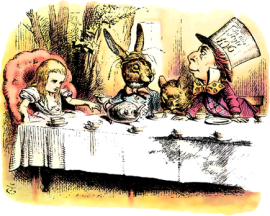By Merrill Weber
The Mississippi River divides Mississippi from New Orleans just like the Tea Party divides the Republican Party. After incumbent Thad Cochran dealt Chris McDaniel a losing hand in June’s runoff election, Tea Party candidate McDaniel turned to the Mississippi GOP for redemption. Unsurprisingly, the GOP dismissed McDaniel’s circumstantial accusations, leaving the Mississippi Supreme Court as McDaniel’s only avenue to challenge what he perceives as a corrupt election. McDaniel’s frustration over the results reflects a serious chasm within the right-wing as the Tea Party pokes a thorn into the Republican Party’s side.

Why would the GOP hear McDaniel’s side, when this Tea Party candidate represents the radical conservative faction that has caused so much trouble for the Republican Party both Washington D.C. and in campaigns nationwide? Consistently, the Tea Party faction has given its parent party strife, increasing gridlock and decreasing compromise in Congress. The Republican Party fronted the blame for 2013’s government shutdown, though Senator John McCain did not hesitate to fault the Tea Partiers for continuing to try to defund Obamacare in complete disregard of the fact that it would do nothing but prolong the shutdown. This “does not stop Obamacare” Senator McCain pointed out, “it stops government.”
Republican Speaker John Boehner told the public that the faction had “lost all credibility” after it caused a bipartisan budget bill to be rejected. While more moderate Republicans may be open to negotiating compromises on issues like immigration and budget reform, catering to the Tea Partiers’ demands pulls the centrists further right. These demanding conservatives put Congressmen in a bind, forcing them to lean further right on legislation to appease the Tea Partiers for votes. However, this attempt to move legislation through Congress risks alienating constituents whose votes are crucial come reelection.
Thad Cochran’s campaign against Chris McDaniels illustrates one real life example. As the Tea Party-endorsed McDaniels champions the “true” spirit of Republicanism, Cochran’s electability as a comparably moderate Republican is threatened. Professor Bertrall Ross, an associate professor at the University of California, Berkeley Law School commented that “Cochran has had to move further right to make himself more palatable to that set of voters.” Professor Ross cautions that once Cochran “gets reelected and is back at Congress, he’s not going to all of a sudden go back to the center because he knows his every move is going to be monitored by a Tea Party challenger.” The competitive presence of the Tea Party twists the well-understood median voter theorem- it is known that candidates move further to the extremes during primaries, but they generally have the latitude to compromise to become more moderate to appeal to the median voter. The concern with this “increasing polarization,” Professor Ross notes, “is that it creates less accountability to the median voter.” The Tea Party’s vice grip on the Mississippi electorate ensures one more vote against bipartisan legislation, and continues to contribute to gridlock.
Another manifestation of this phenomenon exists in Kansas. This year, career Senator Pat Roberts ran for reelection. In a state dominated by agriculture, Roberts succumbed to Tea Party pressures and voted against the farm bill in January of 2014. He continued to vote against his constituents’ interests as he opposed another bill containing funds for a project at Kansas State University, hoping that moving further right in his voting pattern would help eliminate both Tea Party competition in Congress and competition from his opponent, Tea Partier Milton Wolf. Roberts made no effort to hide his conservatism during his campaign in Kansas, saying “our country is headed for national socialism,” a comment that surely endeared him to the far right, but potentially alienated himself from the more moderate constituents he should be courting.

Roberts managed to defeat his opponent in the primaries, radiologist Milton Wolf. Though Wolf’s character had been defamed after posting patients’ x-rays on Facebook, Roberts still outspent Wolf by 1.8 million dollars. If Wolf had not gained such a poor reputation, Roberts’ immoderate vote pattern could have surely cost him his seat in Congress. Now Roberts must overcome the independent Greg Orman, a feat that can hopefully be accomplished with attack ads and assistance from the GOP. Tea Party influence on the Hill could have negative consequences for the GOP at the polls, though recently the Republican Party has been particularly successful in winning a majority of primaries, with the exception of Eric Cantor’s stunning loss to David Brat. Still, this may be in part because Republicans have been funneling millions of dollars into primary elections to defeat the troublesome faction’s candidates, losing only three incumbent Republican seats. Reinforcing the connection between funds and winning, the Republican donors have drained an unnecessary amount of resources in the primaries that could have been used for future purposes.
Perhaps realizing that creating excessive gridlock in Washington would not make them popular, Congressmen who affiliate with the Tea Party have shown signs of willingness to cooperate in recent weeks. In discussing a spending bill, Alabama’s Republican representative Mo Brooks said, “We need to pass whatever funding necessary to prevent a government shutdown,” showing colors of compromise not typically associated with Tea Party supporters. In their own right, Republicans also sang a tune of camaraderie as Congress delayed its escape to summer recess in order to come to a conclusion on immigration. New House Majority Whip Steve Scalise approached Idaho’s Raul Labrador for assistance saying, “I understand you’re an expert [on immigration]; I really need your help.”
These could be signs of a new relationship between the Tea Party and the Republican Party. Pointing toward ways these two parties could collaborate, Professor Ross speaks of a future with the “coordination, but separation of lead roles” amongst the Republican party leaders and Tea Party advocates. A situation in which the Tea Party is “taking on lead roles on certain issues and they are advancing with approval of the mainstream Republicans who are concerned about broader appeal.” In turn, Professor Ross argues that these moderate Republicans would be “incorporating and infusing their ideas and their policies and their actions without labeling it as such.” Though it would be conducive to all aspects of government if this were the case, have the Tea Partiers given up the fight just yet? “A lot of it depends on how these next elections play out,” says Professor Ross. We’ll find out soon as the the 2014 midterm elections get underway.
If the Tea Party can integrate itself into the Republican Party in a constructive manner, it would serve both Republicans and Democrats much better. Reducing a key source of gridlock in Congress would not only help legislation pass from the House into the Senate, but it would also please the electorate. Less competition in the primaries would give Republicans more resources to contribute to general and presidential races, and create a uniform platform the typical voter could understand. While the Mississippi River won’t be changing its course any time soon, there’s still hope for Republicans and Tea Partiers on Capitol Hill. The division that the McDaniel-Cochran case represents can be redirected into something positive with proper coordination. If both the G.O.P. and the Tea Party continue to show signs of amiability, the two could work together to keep the Republican Party true to traditional values while maintaining a spirit for progress.
Featured Image Source: dailykos.com, graphic by Donkey Hotey, Jan. 2014





Be First to Comment